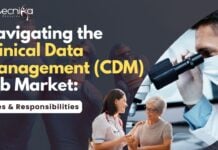Alice Zhang Verge Genomics – Journey From Princeton to Verge Genomics
Voice of Biotecnika – Episode No: 57
“Entrepreneurs have a mind-set that sees the possibilities rather than the problems created by change.”
Hello and welcome everyone to yet another interesting episode of Voice of Biotecnika podcast. Today we are going to unveil the success story of a young Biotech entrepreneur, who appeared on Forbes’ list of the 30 Under 30 in Science.
Ms. Alice Zhang, a Biotech entrepreneur, is the Cofounder of Verge Genomics, a company that employs the exponential advances in computational genomics combined with new insights into neuroscience to discover drugs that dramatically improve the lives of patients suffering from neurodegenerative disease. For over seven years, Ms. Zhang has been at the forefront of computational biology research, initially at the National Cancer Institute, then at the Lewis-Sigler Institute for Integrative Genomics at Princeton University and ultimately at UCLA. During this time, four peer-reviewed papers were co-authored by her in high profile journals such as Cell and Neuron. She is a 2012 recipient of the prestigious Paul & Daisy Soros Fellowship for New Americans. Ms. Zhang was lately named as a Forbes 2017 30 Under 30 Featured
Honoree. She completed her graduation from Princeton University magna cum laude with high honors in Molecular Biology.In 2010, she began training in the UCLA-Caltech MD/Ph.D. program, with a focus on neuroscience, where she spent five years investigating gene networks involved in neuro-regeneration. “While Alice Zhang was carrying out her Ph.D. and MD at UCLA, she was shocked to learn that 90% of medicines that start human trials fail. Nevertheless, an exciting convergence of machine learning and genomics has created the unique opportunity to take the guesswork out of drug discovery. Diseases that were previously thought to be incurable, such as Alzheimer’s disease, are within reach. She further said ‘It’s still largely a guessing game.’ While she was training in the UCLA M.D./Ph.D. program in neuroscience, Alice Zhang made an acute decision to unveil a genomics startup that would accelerate and lower the cost of the drug discovery process by combining innovation in genomics, neuroscience and machine learning. Her startup, Verge Genomics, was launched in 2015 and is working to use machine learning and genomic data to tackle neurological disorders.
Alice Zhang founded Verge Genomics with the vision of building the world’s first pharmaceutical company that uses machine learning to tackle neurodegenerative diseases with artificial intelligence. Its vision is to rapidly develop life-saving treatments for some of the biggest unaddressed diseases of our time – ALS, Alzheimer’s disease, and Parkinson’s disease. It Verge Genomics is trying to make drug discovery faster and cheaper, as currently, it takes about 12 years and $2.6 billion to get a single drug to market. In Verge Genomics, human genomics data is used to find drugs that are used to treat diseases such as ALS, Alzheimer’s disease, and Parkinson’s disease. Shockingly, neuroscience is still filled with assumptions and guesses, as drug discovery is still not as effective as it could be. The goal of the Verge is to take the guessing out of drug discovery. At Verge, hundreds of genes that cause disease can be mapped out and drugs that target all of them at once are found out. Human Genomics, Systems Biology, and Stem-cell Modeling are all amalgamated, and thus Verge has developed a drug discovery engine. Rather than just treating the symptoms, drugs that reverse the disease are found out through this engine.
In a span of a few years, Alice Zhang’s Verge Genomics has amassed a group of leading experts in applied math, biophysics, drug development, machine learning, neuroscience, and statistics from UCLA, Stanford, Oxford, and UCSF. Heavy investments were also made by Verge in the creation of its own proprietary datasets, producing one of the field’s principals and all-embracing databases of ALS and Parkinson’s disease patient genomic data through partnerships with government and a dozen top-tier academic organizations. Verge Genomics, The 7-person company has raised $4 million so far and is working on development with several pharmaceutical companies. Today, Verge Genomics is a team of 14 people that combines some of the top talents in machine learning and mathematics who sit side-by-side with neuroscientists and pharma veterans.
On being asked why Alzheimer’s disease was decided to be tackled first, Zhang said that tackling neurodegenerative diseases was for two reasons. The first is that the world’s biggest unmet medical need is neurodegeneration. One of the only diseases with growing death rates over the last decade is Alzheimer’s disease. Yet, there are no such drugs that cease or even slow the progression of this disease. One major reason for this fiasco is that our current models of these diseases are too simple to deal with the immense complexity. In these most complex diseases, machine learning can make the biggest difference.
Zhang says that in the last couple of years, there is an exciting growth of new machine learning technologies and an explosion of genomic data. As compared to the cost of computing, the cost of genome sequencing has dropped quite faster over the last decade. At Verge, all genomic data are used to improve on the current drug discovery model in three primary ways. The first is that algorithms on human genomic data are used to map out hundreds of genes that are causing disease, instead of looking at one gene at a time. Secondly, human data is used from day one to identify the relevant genes to understand the disease, instead of relying on animal data until clinical trials. Lastly, genes causing disease are computationally predicted, instead of blindly screening drugs. It is then used to predict a drug that will target the disease genes. So, instead of just screening hundreds of thousands of drugs, only 70 can be tested. Further, one important difference at Verge is that a lot of its own proprietary data can be generated. Unlike many companies, which usually rely on public data, Verge generates its own data by collecting thousands of patients’ brain samples and spinal cords and sequencing are done internally by themselves.
So that has given Alice Zhang Verge Genomics – enough data; one of the prime values of the Verge platform is that a huge amount of patient data is available, and then the second important point is that it just does not make predictions and leave them hanging. Verge has its own internal labs and animal facilities that produce validation data. Every time a prediction is made, it is quickly tested in the lab, the hypothesis is validated, and a huge amount of data is generated that feeds back into the Verge platform which continues to upgrade and retrain it. Proprietary validation data is also available and the machine learning algorithms are fed by those two combined and thus helps them improve over time.
Further, at Verge, investigators study individual hypotheses about what causes disease in isolation. Instead of letting human bias influence the studies, there is actually a model that integrates multiple mechanisms and takes into consideration the whole landscape and a snapshot of what disease looks like. It has also been shown that a new mechanism for a disease can be found and has been validated; a paper was published in Nature Medicine with the collaborators of Verge that identified the new mechanism of disease.
There have been advances in genomic sequencing and the cost of genome sequencing that have generated enormous amounts of data sets, and thus finally makes possible to start running machine learning. One of the core thesis at Verge is to realize the full potential of AI that is needed to integrate computation and biology. For Verge, it was thus important from day one, to have an integrated team.
Currently, the team is 14 and it is not only the machine learning and mathematicians but they sit right next to neurobiologists and pharma veterans. It is not just a computational platform that Verge has, but they also have their own lab and facilities. They have their own labs where validation data can actually be generated, that feeds into the algorithms and improvises it over time. Verge makes the most promising uses of AI in biology in drug discovery as it has both sides of the coin where they not only have the computational horsepower, but they also have the biologists on the team and the labs to actually generate that close up the feedback loop.
Verge’s focus is first advancing the current drugs along closer to the clinic. It aims to expand the team so that it can start bringing on chemistry – thereby hiring chemists as well as translational medicine scientists. It is also expanding the pipeline, thus adding more diseases to the portfolio. Describing Verge’s business model, Zhang said that it is a pharmaceutical company being built; drugs are being developed by themselves and is benefitted directly from the decrease in cost and also the time it actually takes to get there. Specifically, Verge needs to be using human genomics to study disease, that these diseases are caused not just by a single gene, but by multiple genes, and further not rely so heavily on just animal models, instead of moving to a more holistic perspective of the disease. Verge is also working on Parkinson’s disease.
Zhang thought that it was such a unique time to start a company such as Verge– as we were going through a revolution where the neuroscience and genomics were converging. Verge became one of the first movers in combining genomics and neuroscience through drug development, and that the advantage of first-mover was very important in biotech. While Zhang was getting her Ph.D., she was writing a publication on her work and she did not just want it to be published and sit on a bookshelf somewhere, rather she wanted it to actually commercialize and help outpatients.
Zhang further admitted that her Ph.D. experience was very valuable and that she couldn’t have started a company without the actual experience she got in becoming an expert in her field. Zhang thought that having a Ph.D. can be useful, but in terms of starting companies, one has started seeing a trend where there is going to be more and more scientists starting companies that don’t appear like traditional biotech companies. There is going to be a huge growing influence of technology in biotech. She further admitted that whenever less money is taken, there is a lower barrier to starting the company at the entry-level and that is when one starts getting democratization of company formation. Zhang advises young people to first learn how to verbalize and communicate science; one has to first understand why science is valuable and it is valuable to whom, whether to the patients or to other companies. Once a person can do that, then he can actually do more than he thinks – and not necessarily within traditional restraints.
“A business has to be involving, it has to be fun, and it has to exercise your creative instincts.”
Thank you all for listening. Keep tuning with Biotecnika Podcast to learn more about the latest updates of the scientific world.









































thanks for knowledge